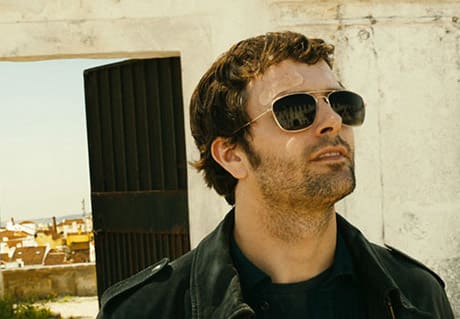Because film is primarily a visual medium – pretentious arguments and theories aside – the prospect of depicting blindness from an experiential standpoint, or rather perceiving it outside of passive voyeuristic spectatorship, provides an inherent challenge. Primarily, how can we perceive and appreciate the nature of what being blind must be like while indulging in a highly aesthetic visual act?
Utilizing a cast of blind actors, director Andrzej Jakimowski immerses us in a Lisbon institute sheltered from the outside world by high walls and an array of caretakers and maintenance staff, where Ian (Edward Hogg), a mysterious stranger, arrives to teach the patients, or students, how to maintain high function despite not being able to see.
Moving about without a cane and having a variety of tricks in hand involving sound reflection and instinct without undue caution, he acts as an ersatz hero to his students, even motivating the reclusive Eva (Alexandra Maria Lara) to engage on a social, possibly romantic level.
What distinguishes Jakimowski's work from being a mere motivational and inspiring parable is both his well-calculated style and his refusal to make saintly those with a disability. Thrusting us into their day-to-day struggles, he frequently films characters in close-up, which leaves us similarly blind to what they're walking into.
We have to rely on the sounds of passing cars and footstep variations to help alleviate the tension that they might be walking into danger. There's also great focus on perspective and the nature of imagination as adjacent visual aid, since the world, while static in physical presence, is ostensibly what they make of it.
But while Ian's motivational techniques and inspirational words of personal empowerment lead his students to believe they can move about the world undetected and subjugated by visual indicators of blindness such as a cane, he is challenged by a seemingly discriminatory doctor that refuses to give his patients false hope. Initially, we support Ian and champion the template of independence, but Jakimowski is quick to remind us that reality is far less idealized and romanticized than the notion that any individual can do anything with the right attitude.
This refreshing honesty and eventual character complexity are what make Imagine far more than the seemingly twee underdog parable it appears to be. The occasional contrivance and a misguided score hinder the overall naturalistic tone, but these are minor quibbles about a film that manages to capture blindness in an entirely unique and powerful way.
(KBMO)Utilizing a cast of blind actors, director Andrzej Jakimowski immerses us in a Lisbon institute sheltered from the outside world by high walls and an array of caretakers and maintenance staff, where Ian (Edward Hogg), a mysterious stranger, arrives to teach the patients, or students, how to maintain high function despite not being able to see.
Moving about without a cane and having a variety of tricks in hand involving sound reflection and instinct without undue caution, he acts as an ersatz hero to his students, even motivating the reclusive Eva (Alexandra Maria Lara) to engage on a social, possibly romantic level.
What distinguishes Jakimowski's work from being a mere motivational and inspiring parable is both his well-calculated style and his refusal to make saintly those with a disability. Thrusting us into their day-to-day struggles, he frequently films characters in close-up, which leaves us similarly blind to what they're walking into.
We have to rely on the sounds of passing cars and footstep variations to help alleviate the tension that they might be walking into danger. There's also great focus on perspective and the nature of imagination as adjacent visual aid, since the world, while static in physical presence, is ostensibly what they make of it.
But while Ian's motivational techniques and inspirational words of personal empowerment lead his students to believe they can move about the world undetected and subjugated by visual indicators of blindness such as a cane, he is challenged by a seemingly discriminatory doctor that refuses to give his patients false hope. Initially, we support Ian and champion the template of independence, but Jakimowski is quick to remind us that reality is far less idealized and romanticized than the notion that any individual can do anything with the right attitude.
This refreshing honesty and eventual character complexity are what make Imagine far more than the seemingly twee underdog parable it appears to be. The occasional contrivance and a misguided score hinder the overall naturalistic tone, but these are minor quibbles about a film that manages to capture blindness in an entirely unique and powerful way.




